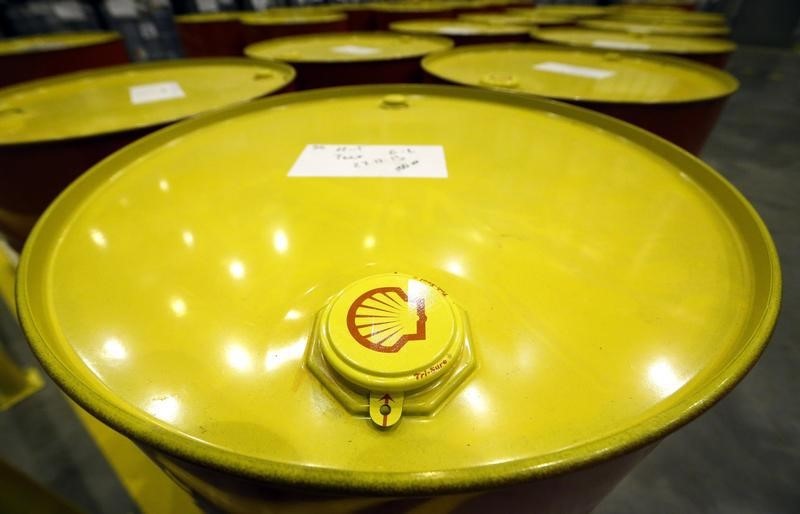(In Oct 27 item, corrects C$ to US$ in ninth paragraph)
CALGARY, Alberta, Oct 28 (Reuters) - Royal Dutch Shell Plc
RDSa.L will not continue construction of its 80,000 barrel per
day Carmon Creek thermal oil sands project in northern Alberta
because of the lack of infrastructure to move Canadian crude to
market, the company said on Tuesday.
Shell said the decision to halt the project was also the
result of "current uncertainties" and chief executive Ben van
Beurden said the company was having to manage costs in today's
low oil price environment.
"We are making changes to Shell's portfolio mix by reviewing
our longer-term upstream options world-wide, and managing
affordability and exposure in the current world of lower oil
prices. This is forcing tough choices at Shell," van Beurden
said in a statement.
Canada's oil sands hold the world's third largest crude
reserves but carry some of the highest project breakeven costs
globally. Western Canada also struggles with market access
issues due to limited export pipelines, which can lead to a glut
of crude building up in Alberta and weighing on prices.
The plunge in benchmark oil prices has prompted a number of
companies to defer costly new oil sands projects, although so
far few have been cancelled outright once underway.
Shell originally sanctioned the Carmon Creek in October 2013
but said in March that it would be delayed by two years as the
company retendered some contracts and adjusted the design to
take advantage of lower costs during the market downturn.
On Tuesday the company said following a review of potential
design options, updated costs, and capital priorities, it had
decided the project did not rank in its portfolio at this time.
Shell, which owns 100 percent of Carmon Creek, will retain
the leases and preserve some equipment while continuing to study
options for the project.
The company expects to take net impairment, contract
provision, and redundancy and restructuring charges of around $2
billion as a result of the decision.
Last month Shell also pulled the plug on its plans to drill
for oil in the Arctic, citing high costs and disappointing well
results and in February shelved plans for its 200,000 bpd Pierre
River oil sands mining project.
- English (USA)
- English (UK)
- English (India)
- English (Australia)
- English (South Africa)
- English (Philippines)
- English (Nigeria)
- Deutsch
- Español (España)
- Español (México)
- Français
- Italiano
- Nederlands
- Português (Portugal)
- Polski
- Português (Brasil)
- Русский
- Türkçe
- العربية
- Ελληνικά
- Svenska
- Suomi
- עברית
- 日本語
- 한국어
- 简体中文
- 繁體中文
- Bahasa Indonesia
- Bahasa Melayu
- ไทย
- Tiếng Việt
- हिंदी
CORRECTED-Shell halts construction on new Alberta oil sands project
Published 2015-10-28, 01:25 p/m
CORRECTED-Shell halts construction on new Alberta oil sands project

Latest comments
Install Our App
Risk Disclosure: Trading in financial instruments and/or cryptocurrencies involves high risks including the risk of losing some, or all, of your investment amount, and may not be suitable for all investors. Prices of cryptocurrencies are extremely volatile and may be affected by external factors such as financial, regulatory or political events. Trading on margin increases the financial risks.
Before deciding to trade in financial instrument or cryptocurrencies you should be fully informed of the risks and costs associated with trading the financial markets, carefully consider your investment objectives, level of experience, and risk appetite, and seek professional advice where needed.
Fusion Media would like to remind you that the data contained in this website is not necessarily real-time nor accurate. The data and prices on the website are not necessarily provided by any market or exchange, but may be provided by market makers, and so prices may not be accurate and may differ from the actual price at any given market, meaning prices are indicative and not appropriate for trading purposes. Fusion Media and any provider of the data contained in this website will not accept liability for any loss or damage as a result of your trading, or your reliance on the information contained within this website.
It is prohibited to use, store, reproduce, display, modify, transmit or distribute the data contained in this website without the explicit prior written permission of Fusion Media and/or the data provider. All intellectual property rights are reserved by the providers and/or the exchange providing the data contained in this website.
Fusion Media may be compensated by the advertisers that appear on the website, based on your interaction with the advertisements or advertisers.
Before deciding to trade in financial instrument or cryptocurrencies you should be fully informed of the risks and costs associated with trading the financial markets, carefully consider your investment objectives, level of experience, and risk appetite, and seek professional advice where needed.
Fusion Media would like to remind you that the data contained in this website is not necessarily real-time nor accurate. The data and prices on the website are not necessarily provided by any market or exchange, but may be provided by market makers, and so prices may not be accurate and may differ from the actual price at any given market, meaning prices are indicative and not appropriate for trading purposes. Fusion Media and any provider of the data contained in this website will not accept liability for any loss or damage as a result of your trading, or your reliance on the information contained within this website.
It is prohibited to use, store, reproduce, display, modify, transmit or distribute the data contained in this website without the explicit prior written permission of Fusion Media and/or the data provider. All intellectual property rights are reserved by the providers and/or the exchange providing the data contained in this website.
Fusion Media may be compensated by the advertisers that appear on the website, based on your interaction with the advertisements or advertisers.
© 2007-2024 - Fusion Media Limited. All Rights Reserved.